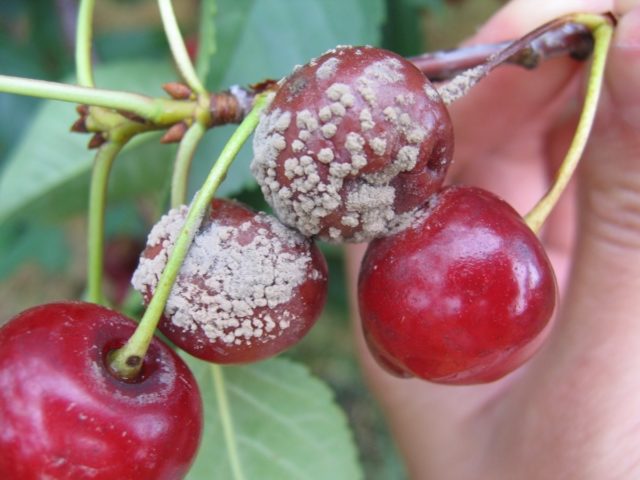Content
Soviet varieties are still competing successfully with new hybrids. Cherry Griot Moskovsky was bred back in 1950, but is still popular. This is due to the large-fruited and high yield of the variety. Its other characteristics are no less successful.
Description of Griot Moskovsky cherry
The variety is classified as medium-sized, bushy cherries. The tree is quite sprawling, densely planted.
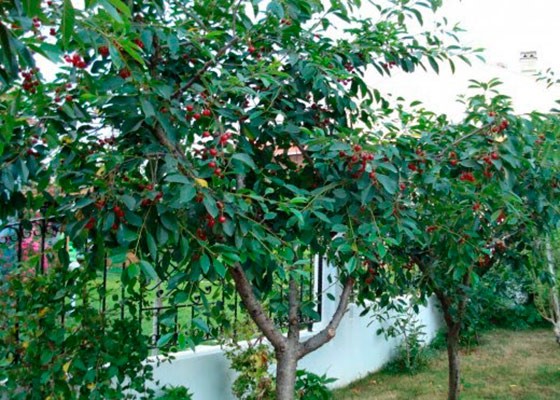
Branches are thin, long, drooping
The leaves are elongated, dark green, dull, their shape is obovate. The bark is brown, brown, with a whitish bloom. In addition to its practical use, the variety also has decorative functions.
The flowering period of the culture falls on the end of May. Griot Moskovsky cherry flowers are small, white, collected in umbrella-shaped inflorescences.
Fruiting occurs on a one-year growth. It is recommended to grow the Griot Moskovsky cherry variety in the central regions of Russia, Moscow and the Moscow region. Cherry Griot Moskovsky tolerates cold well, has stable fruiting.
Height and dimensions of an adult tree
Cherry Griot Moskovsky, growing, reaches a height of about 3 m. The crown of the tree is dense, spreading, spherical in shape.
Description of fruits
At the stage of technical maturity, the weight of medium fruits can reach 3 g, large ones - up to 5 g. With a lack of moisture, the berries become smaller, their weight decreases to 2.5 g.
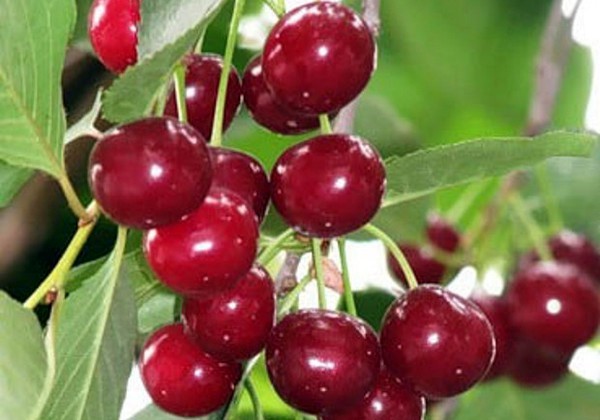
The shape of the cherries is correct, round
Their color is dark red, in overripe fruits it is almost black. On the thin skin, small, dark specks appear in the form of dots.
The flesh of the cherry is dark red, juicy, medium-dense. The skin is thin, glossy, not rigid. The variety is classified not as a canteen, but as a technical type.
A small, round, light-colored bone is difficult to separate from the pulp. The separation of the fruit from the stalk is wet. The fruits are suitable for fresh consumption, but due to the sour taste, they are more suitable for processing.
Cherry pollinators Griot Moskovsky
To achieve fruiting of this culture, self-fertile varieties are planted nearby. Cherries are suitable for these purposes: Vladimirskaya, Orlovskaya early, Pink flask, Lyubskaya, Shubinka, Shpanka Kurskaya.
The flowering of the variety begins in the second half of May. If the month is cold, this process can shift by a week. In the photo you can see how cherry blossoms, Griot Moskovsky, can become a real decoration of a spring garden.
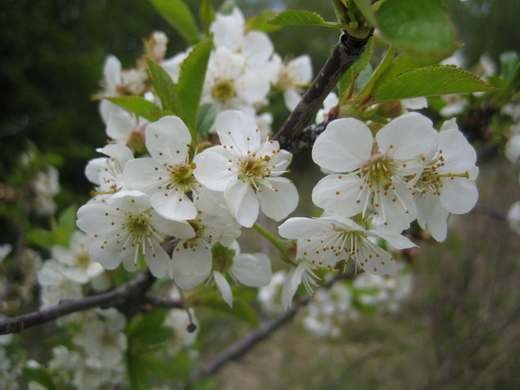
Small snow-white petals are collected in inflorescences
Main characteristics
The Griot Moskovsky cherry variety was created for regions with a temperate climate. You can grow a culture and get a bountiful harvest if the summer is not hot.
Drought resistance, frost resistance
The variety does not tolerate drought, it needs regular and abundant watering. Initially, it is better to plant seedlings under the cover of a tall building or tree.
The variety is considered frost-resistant, but experienced gardeners recommend sheltering a young tree for the winter. If the air temperature drops below -30 ᵒС, the root system may freeze.
Yield
Fruiting of the Griot Moskovsky variety begins in the second half of July. The first crop is harvested 4-5 years after planting.
With proper care, up to 16 kg of cherries can be harvested from one tree. On average, this figure does not exceed 10 kg.
The variety is universal in its application, it belongs to technical, not dining. The fruits are not suitable for long-term storage and transportation due to increased juiciness and wet separation from the stalk.
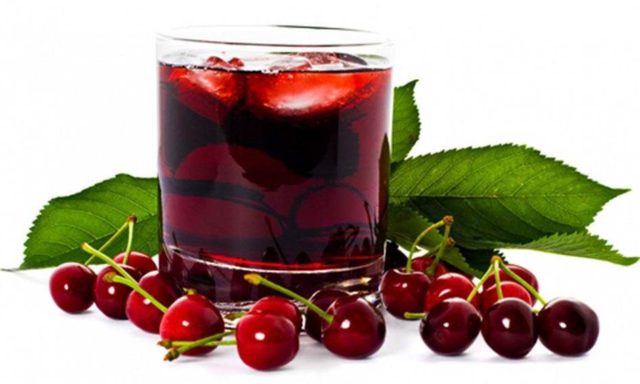
Juices, jams, preserves are made from berries
Advantages and disadvantages
Culture has many positive qualities. But, in addition to its positive properties, the Griot Moskovsky cherry has a number of disadvantages:
- self-infertility;
- susceptibility to coccomycosis;
- impossibility of transportation and long-term storage.
Low yields and average taste can complete this list.
Positive aspects of the variety:
- regular fruiting, even in adverse weather conditions;
- early maturity;
- frost resistance;
- universal purpose of the variety.
The list of positive qualities can be supplemented by the rather high resistance of the Moscow Griot variety to scab.
Landing rules
In order for the Griot Moscow cherry to start bearing fruit quickly and abundantly, you need to familiarize yourself with the rules for planting it. They are quite simple, if they are observed, the garden will be replenished with another winter-hardy seedling.
Recommended timing
Cherry Griot Moskovsky is planted in mid-April before the buds of the seedling bloom. With a later planting, the survival rate of the seedling decreases.
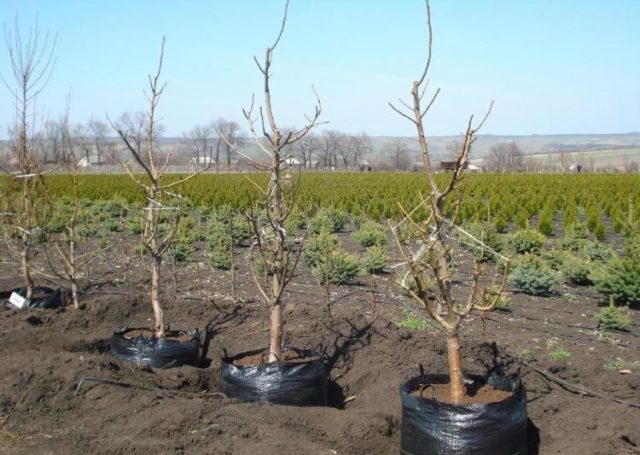
Autumn planting for this variety is not recommended - there is a risk of freezing of the root system of a young tree
Site selection and soil preparation
An open, well-lit area is chosen for cherries. It is important that on one or more sides it is protected from the winds.
The soil should be loose, moderately moist, the close occurrence of groundwater will negatively affect the survival rate of the seedling.
Before planting, the soil is loosened, organic or mineral fertilizers are applied, and moistened.
How to plant correctly
A hole is dug out 2 times the rhizome of the plant. Fertile soil is introduced, a peg is installed - a support for the trunk.
The seedling is placed vertically with the rhizome down. In this case, the root collar should be 3 cm above the ground level.
The root is covered with loosened soil, tamped. At the last stage of planting, the seedling is watered abundantly.
Care features
Proper maintenance is just as important for the health of the tree. Cherry Griot Moskovsky needs regular watering and feeding, pruning, preparation for the winter period.
Watering and feeding schedule
In temperate climates, cherries do not need watering. If the summer is dry, the rhizome of the tree is moistened 2 times a month. It is especially important to carry out this water treatment during flowering and fruit formation.
Top dressing is applied from 3 years after planting Griot Moskovsky cherries. In early spring, it is necessary to provide the culture with nitrogen fertilizers, during the flowering period, complex fertilizers are used, in the fall, after harvesting, potash or phosphate fertilizers are used.
Pruning
The first time the Griot Moscow cherry is pruned after planting. Crooked, broken shoots are removed, the rest are shortened by 1/3.
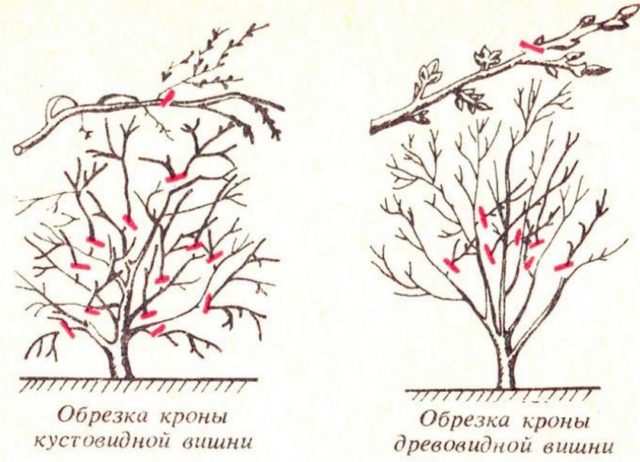
Subsequent pruning is carried out annually in the spring, after the temperature is above zero.
Too long shoots are shortened, the crown is thinned, damaged branches are removed.
Sanitary pruning is necessary in the fall. They spend it after dropping the foliage. Damaged or infected shoots are removed.
Preparing for winter
Cherry Griot Moskovsky belongs to winter-hardy varieties, but it is recommended to prepare it for winter, like other crops.
Important procedures:
- In October, the trunk is treated with lime.
- Before frost, the tree is watered at the root.
- Sanitary pruning is carried out, fallen plant residues are removed from the site.
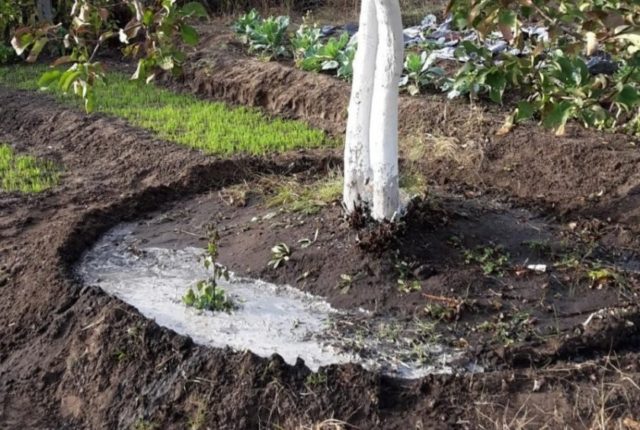
The soil on the personal plot must be dug up, and top dressing under the tree
Diseases and pests
The described garden variety is one of the few that is resistant to scab. But at the same time, Griot Moscow cherry is susceptible to fungal diseases (coccomycosis and moniliosis). As a result, colored swollen spots form on the surface of the leaves of the culture, and a pale pink bloom appears on the back of them. 2-3 years after the disease, the tree dies.
At the first signs of a fungal disease, the culture is sprayed with a solution of copper sulfate or Bordeaux liquid. The first procedure is carried out in the spring. Re-spray the tree after flowering with copper oxychloride. The last antifungal treatment is carried out in the fall after harvest. A 1% solution of Bordeaux liquid is used.
In autumn, fallen leaves affected by the infection are burned, leaving them on the site is prohibited. They are a source of infection for neighboring horticultural crops.
To protect against pests, the treatment in spring and autumn of trunks and shoots with a solution of lime helps well.
Conclusion
Cherry Griot Moscow is a proven variety. Despite the low taste, this is a fairly common culture in the areas of domestic gardeners. Not too tall, a split tree gives a good harvest, juicy berries, suitable for making juices and jams. Among the disadvantages are low keeping quality and the impossibility of transporting fragrant berries.
